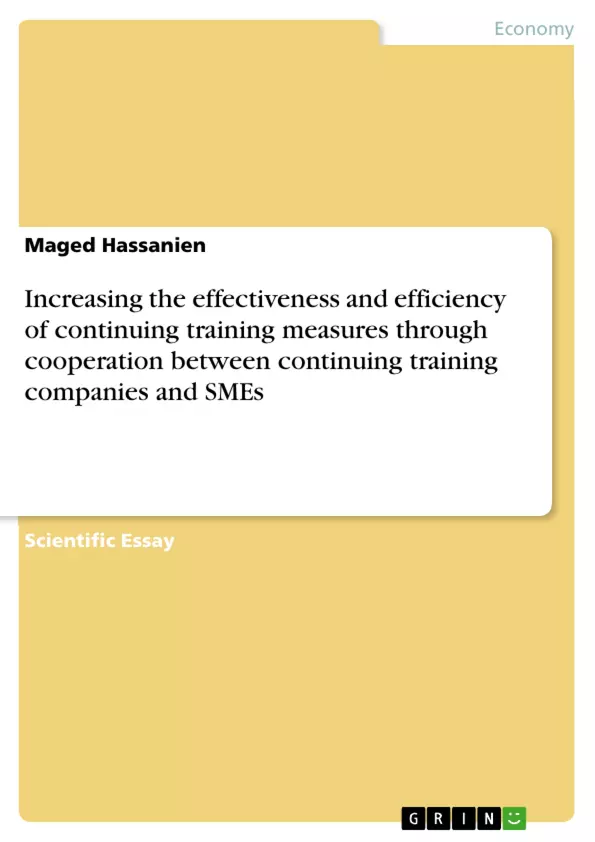One of a company's competitive advantages is its organizational ability to use strategically important competencies for its own innovation and value creation processes. In this way it improves its competitiveness.
Many small and medium-sized enterprises (SMEs) do not use this opportunity for more growth.
The companies surveyed clearly indicated that they usually have no local conditions and resources of their own to develop competence development strategies and to follow them up on transfer success and measure them for success in further training.
The structures and processes for personnel development and thus the internal services for changes and innovations in the operative processes are hardly developed in these companies.
The assessment of success by the training companies commissioned with the implementation of qualification and development measures is limited to the learning field.
In order to ensure knowledge transfer, however, it would be necessary to extend further training controlling to the fields of activity of the participants. After all, it is not only a question of whether the participant has acquired a learning success, but whether he is in a position to implement the learning success.
Benefit-oriented evaluations, i.e. evaluations of the success of qualification measures from the economic perspective hardly play a role in practice.
The low equity ratio in SMEs hampers investment in professional skills development. Last but not least, there is a lack of marketable services to support innovation processes in SMEs.
How can the development of skills for innovation processes in SMEs be promoted by innovative continuing training companies and how can the success of continuing vocational training be measured and evaluated for the company, its employees and the participants?
A strategic field of action for continuing training companies is the systematic development of tailor-made services to support learning in dialogue with SMEs. Their wishes and needs are the starting point and the benefit, the goal of the development process in which they are integrated as customers by the training companies. The concept of "Innovation and Value Creation Partnership" (IWP) is a model for systematic service development in continuing training companies.
Inhaltsverzeichnis (Table of Contents)
- Competencies for innovation and value creation processes
- IWP - a concept for dialogical performance development
- Conception of participative further training controlling
- Methodological principles
Zielsetzung und Themenschwerpunkte (Objectives and Key Themes)
This text examines the development of competencies for innovation and value creation processes in small and medium-sized enterprises (SMEs), focusing on the role of continuing education companies in supporting these processes. It explores the development of a concept called "Innovation and Value Creation Partnership" (IWP) which promotes dialogical performance development between continuing education companies and SMEs.
- The need to develop competencies for innovation and value creation in SMEs
- The role of continuing education companies in supporting this development
- The "Innovation and Value Creation Partnership" (IWP) concept
- The development of tailor-made services for qualification and development processes in SMEs
- The importance of participative further training controlling
Zusammenfassung der Kapitel (Chapter Summaries)
- Chapter 1: Competencies for innovation and value creation processes This chapter discusses the importance of organizational ability to use strategically important competencies for innovation and value creation processes in SMEs. It highlights the need for tailored competence development strategies and the challenge of measuring transfer success and evaluation.
- Chapter 2: IWP a concept for dialogical performance development This chapter introduces the "Innovation and Value Creation Partnership" (IWP) as a model for systematic service development in continuing education companies. It emphasizes the importance of dialogue and collaboration between continuing education companies and SMEs in developing tailor-made services.
- Chapter 3: Conception of participative further training controlling This chapter presents the concept of participative further training controlling, a framework for planning, controlling, and monitoring training and further training in SMEs. It highlights the importance of active employee involvement and the integration of economic and pedagogical criteria.
- Chapter 4: Methodological principles This chapter discusses the methodological principles underlying the concept of participative further training controlling, based on Donald L. Kirkpatrick's four-level model of evaluation. It emphasizes the importance of a comprehensive evaluation approach that considers learning, activity, and economic and pedagogical dimensions.
Schlüsselwörter (Keywords)
The key topics and keywords of this text include innovation, value creation, SME development, continuing education, IWP, dialogical performance development, participative further training controlling, and Kirkpatrick's four-level model of evaluation.
Frequently Asked Questions
What is the "Innovation and Value Creation Partnership" (IWP)?
IWP is a model for systematic service development where continuing training companies and SMEs work in dialogue to create tailor-made competence development strategies.
Why do SMEs struggle with competence development?
Many SMEs lack the internal resources, equity, and structures to develop long-term strategies and measure the economic success of further training.
How can the success of training in SMEs be measured?
The text proposes participative further training controlling, which extends evaluation beyond simple learning success to include activity in the workplace and economic benefits.
What is Kirkpatrick's four-level model of evaluation?
It is a methodological principle used to evaluate training based on four levels: reaction, learning, behavior (transfer), and results (impact on the organization).
What is the role of dialogue in this context?
Dialogue ensures that the services provided by training companies are exactly aligned with the specific needs and innovation processes of the SMEs.
- Quote paper
- Dipl.-Betriebs- und Verwaltungswirt Maged Hassanien (Author), 2018, Increasing the effectiveness and efficiency of continuing training measures through cooperation between continuing training companies and SMEs, Munich, GRIN Verlag, https://www.grin.com/document/436944



